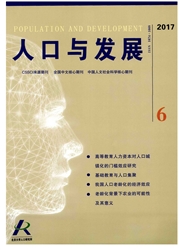

 中文摘要:
中文摘要:
利用2008年安徽乙县4镇农村调查数据,定量分析了不同婚姻状态下的农村男性的养老意愿现状及形成机理,揭示了男性的婚姻状态与其养老意愿之间的密切关系。婚姻对农村男性养老意愿的形成具有显著的影响作用,已婚男性的家庭意识强于大龄未婚男性,他们更倾向于依靠子女并与子女共同居住的养老模式;大龄未婚男性对未来的养老问题忧虑重重,他们把更多养老希望寄托于政府。
 英文摘要:
英文摘要:
Using the data from a survey conducted in 4 towns in Yi county of Anhui province in 2008, the paper makes a quantitative analysis on the desire for old - age support of rural men of different marital statuses and its mechanisms, in order to find out the close relationship between men' s marital statuses and their desire for old - age support. The results indicate that marriage has a significant effect on the desire for old - age support of rural men, among whom the married men' s sense of family is stronger than that of old unmarried men; the married men tend to rely on their children and co -reside with them when they get old, while the old unmarried men are rather worried about their old -age security.
 同期刊论文项目
同期刊论文项目
 同项目期刊论文
同项目期刊论文
 期刊信息
期刊信息
